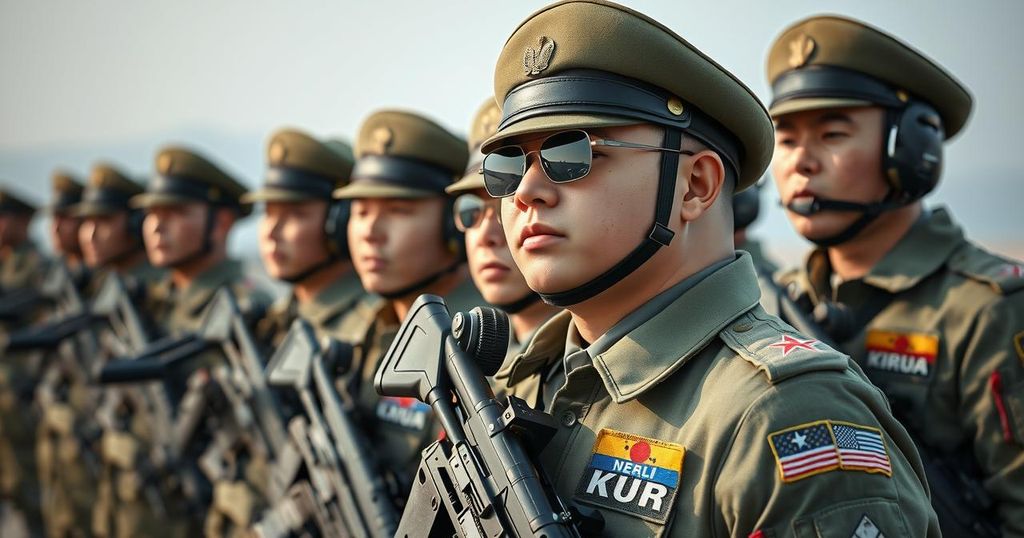Former North Korean Soldiers Share Insights on Troops in Russia’s War
The article discusses the experiences of former North Korean soldiers and their insights into the conditions faced by troops deployed to assist Russia in its conflict with Ukraine. It highlights their inadequate training, malnourishment, and the psychological conditioning that affects their combat readiness. Despite these challenges, loyalty and ideological training could drive these soldiers’ performance in battle.
Haneul, a former North Korean soldier, vividly recalls enduring extreme hunger during his military service, where he lost significant weight due to inadequate rations consisting primarily of cracked corn and spoiled vegetables. His battalion faced similar conditions, leading to mass malnutrition, with limited access to better food until they were stationed at the border with South Korea. Despite attempts by the regime to provide better nourishment to loyal units, many soldiers still suffered from malnutrition. Haneul eventually defected in 2012, which highlights the stark realities faced by North Korean troops being deployed to support Russian forces in Ukraine.
Reports indicate that approximately 11,000 North Korean soldiers have been sent to assist in Russia’s efforts in the Kursk region against Ukraine. While South Korean officials suggested that these soldiers might face significant casualties, experts assert that their training, particularly within the elite Storm Corps unit, should not be underestimated. According to defectors, these soldiers are handpicked based on physical attributes but remain underfed and lack modern combat training. Videos circulating online portray these North Korean troops as younger and frailer than represented in state propaganda, raising concerns about their combat readiness.
Defector Ryu Seonghyun noted that the initial years of military training are exceptionally challenging and intensify with rigorous survival training. Despite their basic training involving combat techniques, the soldier’s ability to adapt to differing terrains in Ukraine raises questions. Furthermore, as Storm Corps soldiers, their role mainly focuses on infiltration rather than direct confrontations, complicating their effectiveness in a flatland environment.
Communication barriers further complicate their deployment, exemplified by a recent incident where miscommunication led to North Korean soldiers inadvertently attacking a Russian battalion. This incident indicates that these troops, while dedicated, may struggle to adjust to the complexities of the conflict.
Defectors emphasize the loyalty and compliance of these soldiers, predominantly from working-class backgrounds who have undergone intensive ideological indoctrination. This allegiance could potentially undermine efforts by Ukrainian and South Korean forces to encourage defection. Even when stationed far from home, soldiers are conditioned to view capture as disgraceful, often resorting to extreme measures in the event of capture namely taking their own lives.
Moreover, the possibility of the North Korean military sending additional troops, potentially numbering in the tens of thousands, looms, suggesting a concerning flexibility for Kim Jong Un to sustain losses without destabilizing his regime. Defections amongst these ranks are seen as unlikely due to the indoctrination and cultural perceptions surrounding military service.
The article illustrates the plight of North Korean soldiers, particularly as they are deployed to support Russian military efforts in Ukraine amid ongoing conflict. Important insights are drawn from defectors who share their personal experiences of rigorous training, food scarcity, and the psychological conditioning faced in the North Korean military. The deployment of these troops emphasizes not only their state of readiness but also the political and military implications of North Korea’s increasing involvement in international conflicts. The inadequate training and combat preparation raise concerns over the capabilities of these forces in a foreign battlefield, especially in light of their harsh realities in North Korea.
In summary, the deployment of North Korean troops to support Russian efforts in Ukraine reveals significant challenges due to their inadequate training and nutrition, as highlighted by various defectors. Despite their loyalty and ideological conditioning, the obstacles posed by communication barriers and the unfamiliar terrain of the conflict may hinder their effectiveness. Furthermore, the regime’s willingness to incur losses enhances the complexity of the situation, indicating that these soldiers’ lives are expendable in the eyes of the North Korean leadership.
Original Source: www.bbc.com




Post Comment